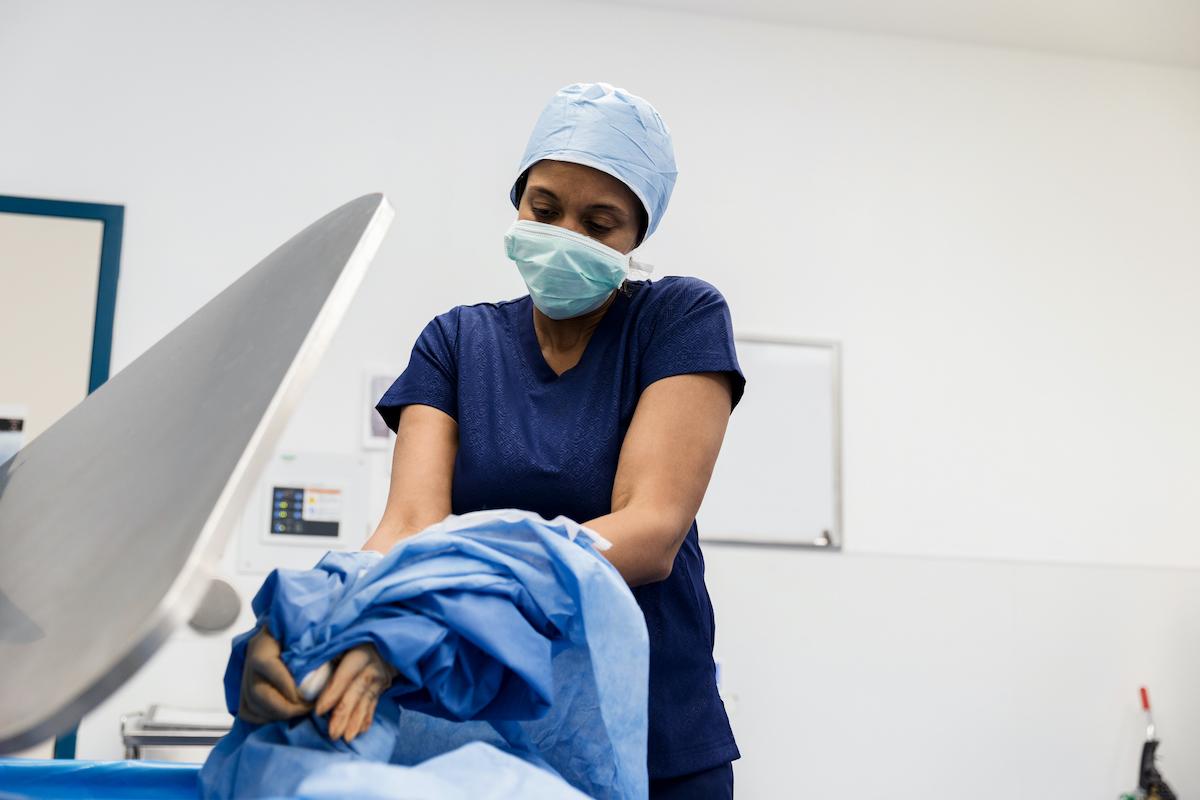Researchers Figured Out How to Recycle Coronavirus PPE Into Liquid Biofuel
A group of researchers believe we can recycle PPE into biofuel.
Updated Aug. 4 2020, 11:39 a.m. ET

Every month that the coronavirus passes, humans are using an estimated 200 billion units of single-use face masks and gloves. Personal protective equipment (PPE) is life-saving for medical professionals, and it's essential that they use all the PPE they need to stay safe during the COVID-19 pandemic. Unfortunately, that results in a lot of trash — but a team of researchers has discovered a way to recycle used PPE into renewable liquid biofuel.
The research comes from a group of experts at The University of Petroleum and Energy Studies in Dehradun, India, and it was published in the Taylor & Francis journal Biofuels. The researchers studied the composition of various PPE, including gloves, face masks (including N95 masks), goggles, face shields, and gowns.
A lot of those items are made from non woven polypropylene, which is traditionally difficult to recycle, but the researchers found that used and defective PPE kits can be recycled using pyrolysis, a process in which high temperatures are applied to break a material down. Putting PPE in a pyrolysis thermal reactor for one hour will convert the material into liquid biofuel, the researchers found.
“This conversion will not just prevent the severe after-effects to humankind and the environment but also produce a source of energy,” the authors explain, noting that the PPE would be transformed into biocrude, a type of synthetic fuel with similar properties to fossil fuels. “Thus, the challenges of PPE waste management and increasing energy demand could be addressed simultaneously by the production of liquid fuel from PPE kits.”
As mentioned earlier, a recent report from ACS Publications' Environmental Science & Technology journal estimated that we’re using 129 billion face masks and 65 billion plastic gloves per month as we face COVID-19. Most of that is going into landfills where it will release greenhouse gases while taking decades to decompose; however, plenty is also becoming litter on our streets, beaches, and oceans, which threatens wildlife.

The good thing about PPE is that it is life-saving for medical professionals who need to keep a sterile environment — but humans have never used quite so much as we have over the past few months.
“Presently, the world is focusing to combat COVID-19, however, we can foresee the issues of economic crisis and ecological imbalance also,” said lead author Dr. Sapna Jain in a statement. “We have to prepare ourselves to meet the challenges which are forcefully imposed by the COVID-19 pandemic, so as to maintain sustainability.”
Dr. Bhawna Yadav Lamba, who co-authored the study, believes the recycling process the team discovered is far more sustainable than incinerating or landfilling used PPE, even though once the biofuel is put to use, it will release greenhouse gases into the atmosphere.
“Pyrolysis is the most commonly used chemical method whose benefits include the ability to produce high quantities of bio-oil which is easily biodegradable,” Dr. Lamba said in a statement. “There is always a need for alternative fuels or energy resources to meet our energy demands. The pyrolysis of plastics is one of the methods to mitigate our energy crisis.”
Of course, renewable energy (such as solar, wind, hydro, and geothermal) is more sustainable and has a lower environmental impact than any synthetic or fossil fuel-derived energy source. But with COVID-19 meaning we’re using more unrecyclable PPE than anyone knows what to do with, this new method of transforming masks, gloves, gowns, and more into liquid fuel could make a big difference.
As an alternative, the recycling experts at TerraCycle offer Safety Equipment and Protective Gear Zero Waste Boxes, starting at $148, which you can use to recycle disposable safety gear such as ear plugs, hair nets, gloves, glasses, and masks, as long as they are not contaminated with any medical waste or bodily fluids.
The best way to prevent contracting or spreading coronavirus is with thorough hand washing, social distancing, and wearing a cloth face covering. If you feel you may be experiencing symptoms of coronavirus, which include persistent cough (usually dry), fever, shortness of breath, and fatigue, please call your doctor before going to get tested. For comprehensive resources and updates, visit the CDC website. If you are experiencing anxiety about the virus, seek out mental health support from your provider or visit NAMI.org.